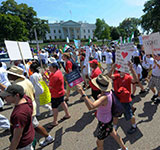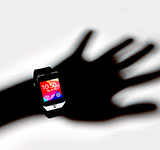 |
Edwin, Trina, and Eli outside their home.
(Photo: Chris Buck) |
Edwards held up his hand as if this was enough information on the platform of Mr. Craig McCullough. “Any support?”
Paul shrugged. Maybe McCullough could peel off some votes from Paul Dietzel II, the pious 28-year-old grandson of a former LSU coach of “Chinese Bandit” fame, or possibly Dan Claitor, the state senator who figured to run well around Baton Rouge, where 45 percent of the votes were in the 2012 election. After that, Edwards asked both Paul and Ricky how many EDWARDS FOR CONGRESS lawn signs they could take. “Couple dozen,” they said. Everyone shook hands and left.
Down the road, at the Lane Regional Medical Center, Edwards stopped in to see a friend, W. T. Price, a longtime Edwards operative in the East Feliciana Parish area. Price had just gotten a knee replacement and lay flat on his back, his large body nearly covering the entire hospital bed. Price recalled one campaign when Edwards said he needed “75 percent” of the parish. “I brought him 90 percent,” Price crowed.
“W.T., how are you feeling?” Edwards asked.
“It hurts. Hurts a lot,” Price said.
“Old men like us, it all hurts,” Edwards said sympathetically. “But don’t worry about it. Your health is more important than any election.”
It was one of those Edwards moments I was beginning to recognize now, the old devil’s methodology, the way nothing is ever said, or done, without some sort of plan, even if the governor himself may not have had conscious knowledge of that plan before setting it in motion. Machiavelli might call it talent. Here was Edwards, the battered but unbowed “boss,” getting his guys together for one last go-round, a final political caper, the back-from-the-dead comeback that would live forever. And right then, W. T. Price began to smile. “Don’t kid me, Governor, nothing’s more important than an election. Working for you, that’s the sweet medicine,” he said.
Traveling with Edwards was a bit like being cast in a series prospectively titled True Politics, which along with True Detective and True Blood could make up a triptych of Louisiana in the national mind-set, with some Duck Dynasty and Swamp People thrown in. Once the most legitimately strange place in the country, with its own eccentric history, food, music, language, ideas about the separation of the living and the dead, and 24-hour drive-thru daiquiri stores, Louisiana was undergoing a serious image makeover. As Brooklyn expands every time any formerly industrialized, crime-ridden zone goes artisanal, Louisiana has become the middlebrow repository for all that is weird. No longer a geographic entity, it is now the official psychic realm of the insufficiently repressed id, where laws of time and space are negated. Where else could you stick a program as bogus as True Detective?
The Edwards candidacy could fit the mold. With his Faustian vitality, he barely seems a man nearing 87. We were in the burnished study of Edwards’s golf-course-estate home where he lives with Trina, her two teenage sons, and Eli, whose brand-new American Flyer red wagon with the EWE FOR CONGRESS bumper sticker was out in the hall. On the study wall was a holy trinity of Louisiana governors painted by the Cajun artist George Rodrigue: Huey Long, Uncle Earl, and EWE, who was pictured in a mystic revivalist camp meeting beneath a banner saying EDWARDS … NOW. On the other side of the room was a poster-size photo of Edwards and Elvis, pointing to each other and cracking up.
Amid the usual jokes and the gambling stories (he says he declared $1.9 million in winnings on his taxes over a ten-year span), Edwards ticked off his scandals: the Tongsun Park Koreagate brouhaha of the 1970s, the twin prosecutions (leading to a mistrial and an acquittal) on the hospital fraud charges of the 1980s that forced him to “run the state out of a pay phone booth” in the New Orleans courthouse. Then there was the late 1990s riverboat casino-licensing case that sent him to jail. One of the more remarkable pieces of testimony came from Robert Guidry, a regular at Edwards’s poker games, who testified that he would leave bundles of $100,000 each month in trashbins behind a doctor’s office.
This was all nonsense, EWE said. Aside from the admitted sin of being “too trusting” of so-called friends, the Zipper was as innocent as the driven snow on a Placquemine hillside.
As for what he did during the 16 years he ran the state, a time during which he managed to rewrite the state’s neo–Napoleonic Code Constitution and modernize the roadways, Edwards waved this off. “I was an administrator. Something came up, I handled it,” said Edwards who had always admired the management style of his political hero, Lyndon Johnson. Running modern Louisiana was pretty straightforward: When the oil business is good and the spoils doled out as widely as possible, people are happy; when the oil business is bad, or the corporations are too grabby, that’s when it gets nasty.
 Subscribe
Subscribe

 Brit Marling on I Origins
Brit Marling on I Origins
 David Edelstein on Richard Linklater's Boyhood
David Edelstein on Richard Linklater's Boyhood Life in Pictures: Solange Knowles
Life in Pictures: Solange Knowles Why It's Hard to Keep Museums Beautiful
Why It's Hard to Keep Museums Beautiful
 Truvada Could Change the Way Many Gay Men Think About Sex
Truvada Could Change the Way Many Gay Men Think About Sex Teachers Unions Turn Against Democrats
Teachers Unions Turn Against Democrats
 Does Anyone Outside Silicon Valley Even Want a Smartwatch?
Does Anyone Outside Silicon Valley Even Want a Smartwatch?

